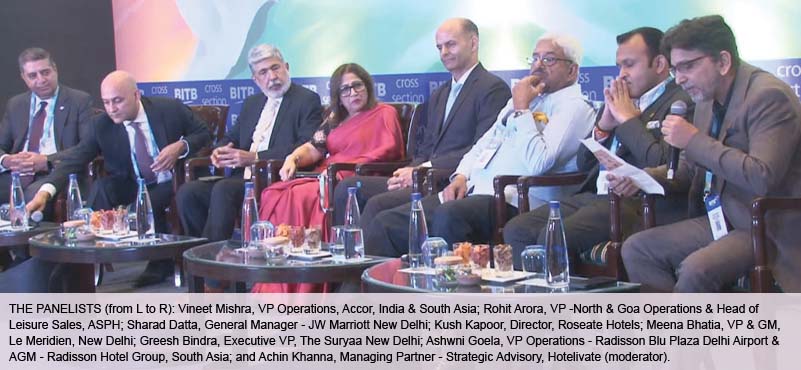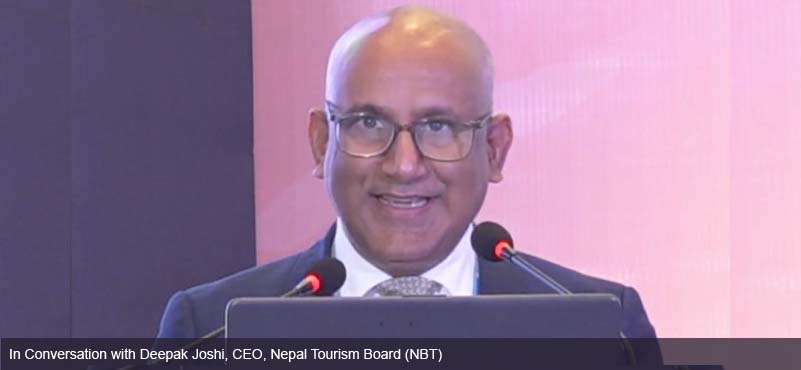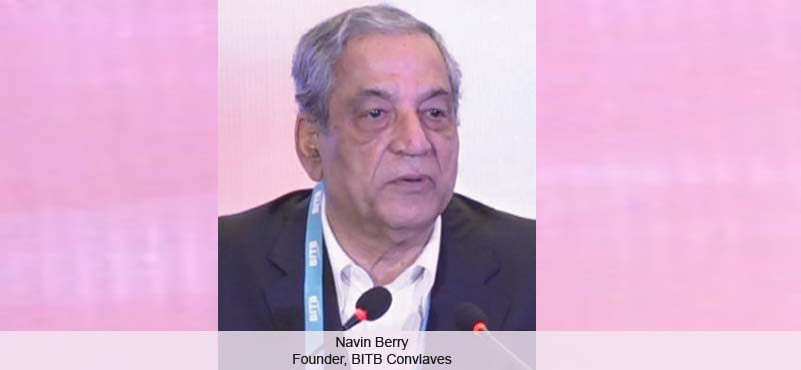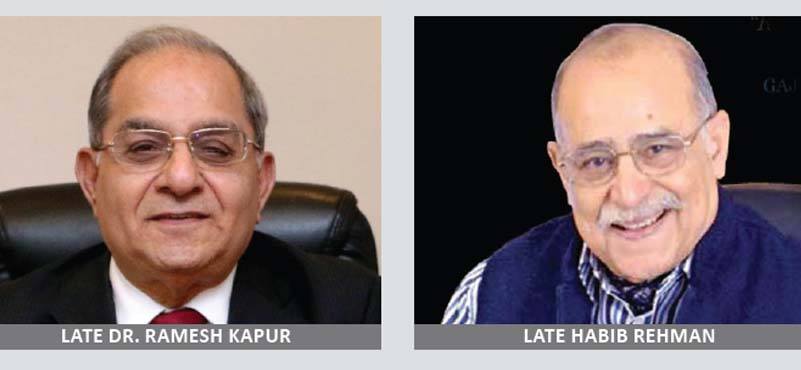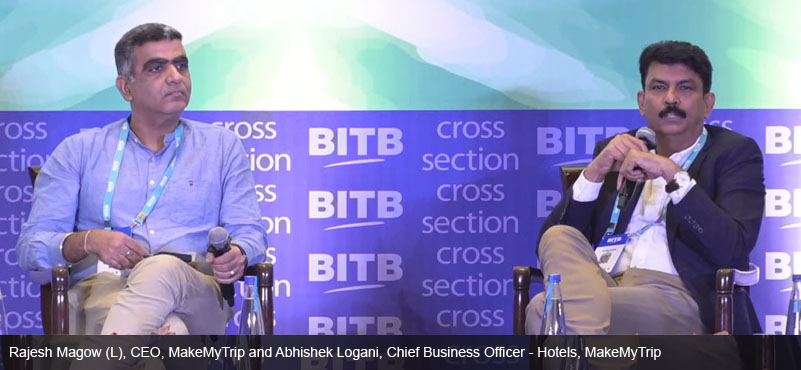Share the post "Delhi and NCR Hospitality, Round Table Conversation"
Achin Khanna: While the topic for this panel is the Delhi NCR market, we’re also going to talk about a few macro issues and then rope it into Delhi NCR. And two, I quickly wanted to set the context if I may. As we all know, Mr. Berry spoke about it briefly as well, the industry has been on a roll, we’re in a strong up cycle. One could argue we’re in year three, three and a half of what’s been a strong recovery post COVID. It is equally true and known well to all of us that this industry is cyclical and that on the heels of every up cycle, there’s a down cycle coming.
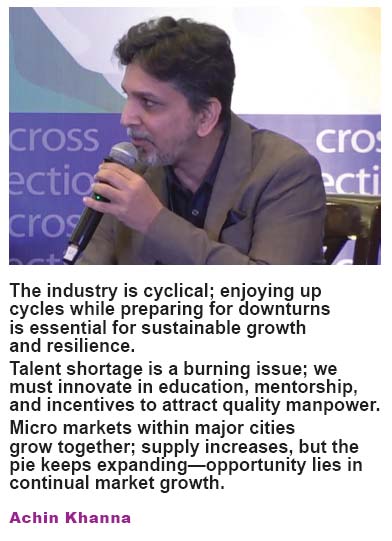 A big part of that question that I’d want to address today, it pertains to that, because as industry professionals, as people owning, operating, and managing these assets, we need to enjoy the up cycles, but prepare for the down cycles, right? And maybe we’re two, three, four years away from the next one, but there is certainly one truth, which is what I’m going to start with, Sharad, which is the supply side.
A big part of that question that I’d want to address today, it pertains to that, because as industry professionals, as people owning, operating, and managing these assets, we need to enjoy the up cycles, but prepare for the down cycles, right? And maybe we’re two, three, four years away from the next one, but there is certainly one truth, which is what I’m going to start with, Sharad, which is the supply side.
There’s a lot of new hotels coming up across positioning, across geographies, across brands, across the country. And that will invariably create pressure on two things. One is demand, because that’s going to grow at the pace it grows. And two is on talent. And this is a question I want to start with. It’s a burning topic. It’s been discussed to no end but Sharad our industry is going to be starving for quality manpower quality people, your across the board thoughts and actions.
Sharad Datta: True what you’ve said, it’s a burning question. I think all of us debate that almost on a daily basis. We were having a discussion the other day and some of our hotels in the Marriott world, we’ve got tie-ups as other companies have with the IHMs. Perhaps that’s where you really need to look at, from a talent perspective of where it starts. There is a challenge, there’s a challenge in attracting youngsters to this industry and I think we all agreed that there needs to be more work done to ensure that we have more students enrolling into the hotel schools and also then in terms of what education they get, what is the product that really comes out of that, right?
While all of them would be employable in some sense of the word but what is the level of skill that really comes out of that. From our hotel and from a Marriott perspective, we’ve looked at going beyond the traditional schools and the sources of talent. I think when you look at something like, let me start with this project called Project Praneetha, where we looked at underprivileged young ladies and across our country, we currently have over 300 young ladies who are in internship with the hotels. We will have them for three years with the hotels and then they will get a degree or a diploma in hotel management and then they get employment. So, this is one of the avenues that we are looking at.
One of the things that I think is a big driver is the financial aspect and I think that is something that needs a little more dialogue and consideration. It is super important to get very robust incentives in place and then train our people how to use those correctly so that at least you have an ancillary source of income other than your basic salary that comes in. Also, I see that there’s a challenge with the young middle managers at this point in terms of two things. I think one, the expectations that they have of the company vis-a-vis the expectations that the company has of them and I am a firm believer that this responsibility really lies with us in order to be able to train them, to equip them to grow which is what everybody wants. So, I don’t think there is a simple answer to this. There is a problem, but it needs to be probably dissected and each part of it needs to be addressed, whether it’s the financial part, whether it’s the basic skilling part. Mentorship plays a huge role in this and I think all of us in some ways have been mentoring young talent through our careers and we need to continue to do that.
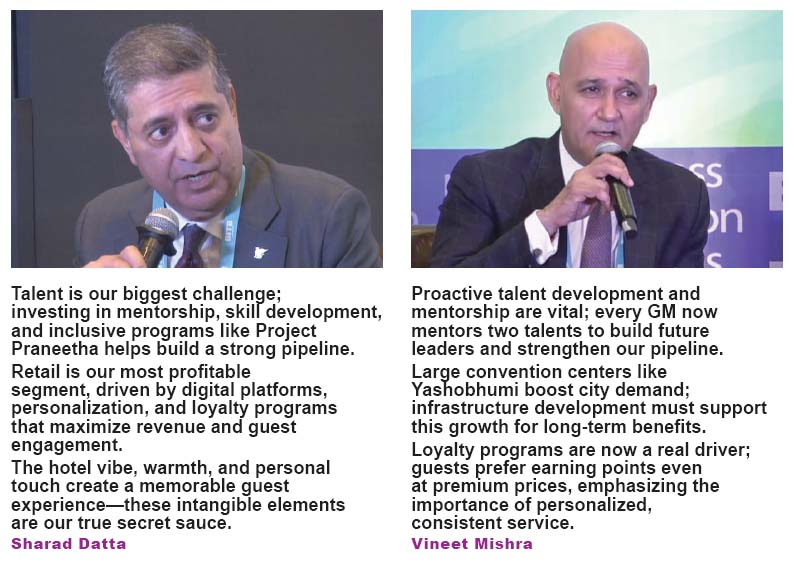
Achin Khanna: Thank you and it’s refreshing as a starting point for the industry to start acknowledging that this is a problem and I’m so pleased you do because that’s the first step, right, before we can solve it. Before we jump into the next one – Vineet, Meena, anybody wants to add on to this topic, anything additionally to say?
Vineet Mishra: First of all, I think nobody will disagree that it was always burning, now it’s blazing for all of us as far as talent is concerned. There are two or three ways of looking at it. One is we are hopeful that at some point of time, someone will show passion or the need to get into hospitality. So that’s a reactive approach. The time has come where we actually have to start looking at it from a very proactive way that we need talent to be with us. Just not out of excitement but also the way we speak and talk about hospitality as a whole. Sure, everyone will agree that the first thought which was put into your head when 25-30 years back, 10 years back, 5 years back was hotel management, sack of potatoes. We will challenge you back on everything that you have. Hotel management, no festivals. Hotel management, you do for someone else. This was our first, that narrative has to change and we all as leaders need to start talking about this.
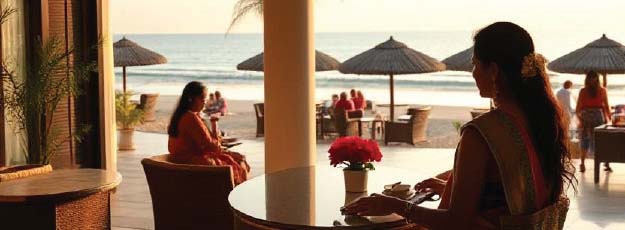
The second part is while it is our responsibility to develop leaders, those who are already at a certain place also have to start looking at how they will develop talent up. With the number of hotels which are coming up, units etc. we will need just not people at rank and file, but also as strong business managers and leaders and that has changed completely. So, for us at Accor, what we’ve done is this year every GM has a KPI of developing two talents in their own hotel. They have to mentor and it’s being measured out for this year, so that we are actually producing something better for our own pipeline and also adding intellectual enhancement. The other part is when I spoke about hotels, schools etc. and Mr. Bahadur does an excellent job in this as well for years together. We are tied up just like what Sharad mentioned with an NGO, it’s called HOPE. Every year, in fact last week we had a graduation of about 170 young kids who have come back and this has been on since 2012. Last year we had 230. Incidentally once people join, we almost have a close to 30% dropout ratio as well in this. But those who come in actually also have a need to find good employment, safe environments to work in and that is how we are actually growing this. So, it’s a 360 for all of us and very important that we drive this further.
Achin Khanna: Rohit, I’ll come to you. Let’s talk business. While I did make a comment that we’re in an up cycle and most markets have been performing quite well, the one market that has taken a bit of a beating in the last two years is specifically North Goa, where you have two properties. And there’s been enough and more about both the branded and the unbranded players, as well as the homestays really competing for the same piece of pie. As the leader who oversees that market, in addition to North India, do you have any thoughts on that?

Rohit Arora: Well, the entire Goa market is down by almost 30 to 40% from last year. Having said so, the occupancies have not dropped so much. The ADR has dropped and on top of it with after this Air India incident they have pulled out almost all their flights citing that the route is not profitable. So out of like normally 150 flights a day now we have got only 86 flights a day into the city of Goa, which is also causing a lot of trouble in terms of price points for the air tickets. As far as the Park Hotels go, we do not have a very big inventory in both the hotels, and they are very strategically placed. So, one is a boutique hotel which is right on the beach, so people are preferring as a destination. The other one is the first adult hotel which we have opened in India. So, these two differentiations create a lot of opportunities for us. And in terms of operations and in terms of manning also, we shoulder each responsibility with each of the hotels. Certain functions like in terms of marketing, in terms of procurement, they are common, but storytelling of both the hotels is different. So that is giving us an edge, yes, in terms of revenues, it is now looking better and I hope that coming months are going to be better than the summer months.
Achin Khanna: Meena, let’s go to you and let’s come back to Delhi NCR since that’s the topic for our panel. There’s no argument that you operate one of Delhi’s best-known hotels for the last many years. And I think one of the questions I wanted to just make you reminisce a bit is that over these time periods, what are some of the big changes you’ve seen in the Delhi hotel market, positive or negative, that you think have altered the way the market behaves?
Meena Bhatia: So Delhi being the capital city, and we are sitting in the seat of power, so we have seen many changes in the last three decades of different nature. I think when we started, it was just Delhi and a few hotels. It was a good situation.
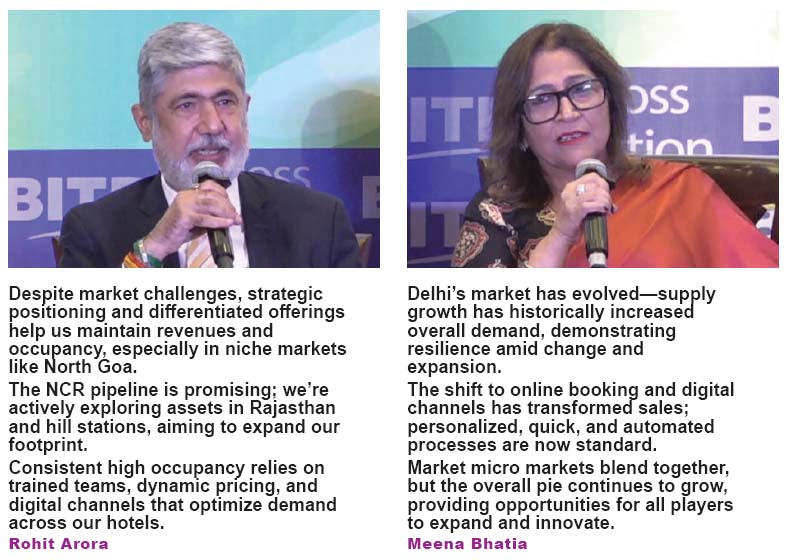
Then came the emergence of Gurgaon and Noida and the NCR regions, which of course brought a big shift. But with every evolution like this, I think the business has only grown and not depleted. So that is a good thing about being in the city centre. Then of course there was an Aerocity surge and a lot of hotels and we were all worried because we thought that the business was going to change and there was going to be a shift but like I said, every addition of supply only increased the business. I think the industry has always been resilient to these changes and it only grows with the supply, so it has been a good situation. As far as the market is concerned, I think in Delhi, primarily, in the last decades, it used to be a major stopover city for leisure business. Leisure used to be about 30 to 35% of our inventory at that time. But post the pandemic, I think the leisure inbound has still to come back to its full form. But having said that, the business, it grew, bounds and leaps, and I think that upcycle is really something that we have all enjoyed.
The business has changed. The way we sell today is very different. There’s a shift from the way we used to go into corporate accounts and have relationships. I think there is a major shift. People book online. It is difficult to define corporate or retail. It’s all a big mix. Everybody is booking online, people are looking for deals wherever you have the best rate. Two decades ago, it was not the case, it was if you know somebody, you get a good rate. Now everything is automated and people have the phone in their hand to do everything.
Achin Khanna: One quick follow up to you Meena. One of the things that most major markets in India will showcase, look at Bangalore, Hyderabad, Pune, there is distinct micro markets within these major cities. Delhi being larger than all of them, to some degree the micro market definition is not that specific. I mean there continues to be overlap between an Aerocity and a Gurgaon and a Central Delhi and a South Delhi, still people are fighting for the same pie.
Meena Bhatia: Yes, fighting for the same pie but the size of the pie is always increasing and I insist on that because I strongly believe that this is what I have seen in my last 30 years of being in the industry. So, it keeps growing. Like if there were new hotels in Aerocity, we opened doors to more business, there is always a price correction with new inventory, that correction happens but the size of the business increases and that’s exactly what is happening at the moment also.
Achin Khanna: Kush, over to you. So, Roseate Hotels has three hotels in India, as you mentioned, two of them in the capital. Other than Roseate House, which has, I think, sizable inventory, you’re generally a company in India that has two assets with finite rooms. And my question to you is as follows.
From an operational standpoint, how do you drive profitability without the economies of scale that I spoke of, that larger chains tend to benefit from? It’s much easier for Sharad or Vineet, I would think in some capacities to drive economies of scale because they have that scale. You have challenges in procurement, staffing, fixed cost management, which they perhaps don’t. Would you agree and how do you handle these?
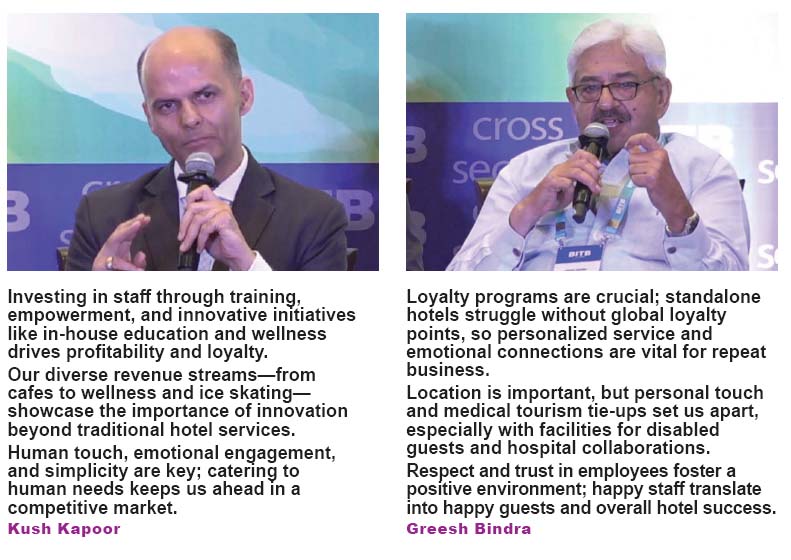
Kush Kapoor: So, I’ll take one by one actually. All my eight hotels currently are into profits here on a yearly basis, otherwise we wouldn’t have been opening our own hotels. Yes, we are also now getting into management because we’re getting decent proposals from the owner, so that’s part one. Second, manning, I’ll take probably 30 seconds, how we kind of overcame the manning issue and we had major challenges like all other brands. Two years back, I got all my contractual employers into the ballroom and I locked the ballroom and I asked them how many of you stay in Mahipalpur and you’ve come from outstation and I had almost about hundred plus of them, security guards, KSD, housekeeping people and everybody on that part. I said, next question was, how many of you have 18 years and above kid? So, either a boy or a girl who’s staying in Mahipalpur along with you or nearby. So I got about like 80 plus of them.
I said, can you get all of them out here who are non-employed? I got all of them and I still remember along with my HR, I locked the ballroom. I was in the ballroom for three full days. And I was training these kids. Because I realized the security guard, because of the daily wages, they were earning 25,000 rupees in hand. If there’s a family of four people, by the end of the month, the guy was only saving about 500 or 1000 rupees in the pocket. Because both the kids are non-earning, right? Either they’re on mobile, TV, there’s no TV, so otherwise they’re going out of the house. I said, I’m going to double your salary from the very first month.
The only thing you’re going to do is, is going to work in the ballroom because I get casuals from outside, like most of the hotels are forced to do that. And I explained them the work. 60 families, the kids agreed. I took three months, got the trainers from outside, including my Bird Academy. So, we met them through the English training course for three months. I paid for their entire thing. Along with that, I got them into personality development training course also. We paid for the entire thing. Three months down the line, they’re working with me. So, I have 60 plus families of my own security guards, contractual employees, gardeners, KSG supervisors, everybody out there who are working in my hotels right now. The salary from 25,000 rupees doubled up to 50,000 rupees in the same family.
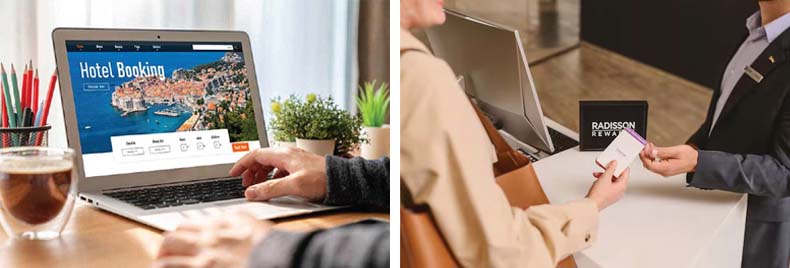
The plus factor, the father and the son cannot do anything because they’re both working in my brand. Second, the loyalty factor, I would not say even double, it has gone 10 times higher on that part. Third, the kid now, after that English training course or the personality course, is going further ahead. Because I’ve spent only a very short period of 26 years in the industry. My financial controllers in the hotel take every week one session on helping these kids to pass their math exam. My IT head takes the sessions, online sessions, or the offline sessions in the hotel, to help them work through the word process, MS word. And now my IT head is actually helping them with the chat GPT. And in about two months’ time, we’ll have our own Roseate chat GPT launched in the market. So that’s putting it in manpower.
Achin Khanna: As a senior leader in the industry and you again with one of the better-known hotels of Delhi for the longest time. It’s no doubt you probably have to fight the challenge of not being a chain scale hotel. Yes, Suryaa has its own reputation, but it’s an independent. And how do you scale that challenge of not being part of the international chain process? I mean, distribution, brand recall, attraction of talent. These are some of the things that the brand actually brings to the table and surely these are challenges that you may have to battle.
Greesh Bindra: Well, you know, you flip the coin. The way I look at it, there are two verticals here. There is a franchise and there’s a managed property. Now, for example, a franchise hotel only has a brand and it’s not like a managed hotel. Managed hotel is run typically from the brand standards, the SOPs of the parent company. You can call it a thin line or you can call it a broad line. There’s a lot of difference between that. The same way, when I run an independent hotel, at one time, we used to be a Crowne Plaza. The Suryaa was a Crowne Plaza many moons ago. So, I’ve fortunately had the thing of working for 22 years with an international brand. I have worked with ITC, I have worked with Taj and I joined my first tenure here was when the Suryaa was a Crowne Plaza. So, for me I think its leadership which is very important. When I break that into bits, 70% of my head of departments are from international brands. So, I have a mix of a Marriott, Hyatt, IHG. So, I have more brains and I have everyone there who are running the hotel. That’s my leadership team.
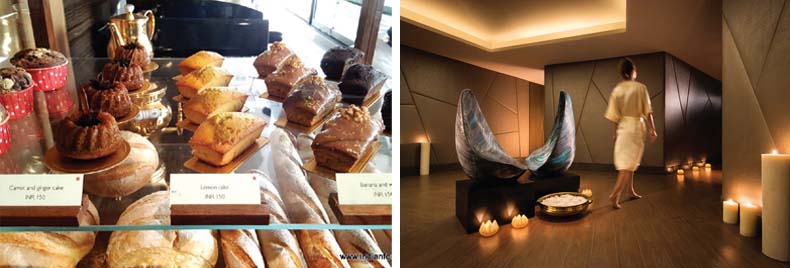
At the same time, I think what is very important is, I always say that there are two kinds of customers. One is an external customer, your guest, and one is your internal customer, who are people, resources. They are equally important like your guest, so you have to give them a personal touch. I’ve divided the hotel into houses, like we used to go back in school and we have inter-house events and everyone is so involved.
So, I agree that it’s not the easiest thing because after a few years people say that we want to leave and we want to go and work with a brand and I always encourage them, I said okay go ahead, no problem and then the best thing is after a few years they come back. So, it’s not easy, but I think at the end of the day, whether it’s your guests or it’s your staff or your colleagues, that personal attention that we can give to them and one more thing there that you know I can be more flexible. I can be very flexible in terms of for example I’m wearing a coat here but I’m wearing a VH coat. These little things make so much of a difference because when you talk to a guest and he says, wow it’s so nice to see you in the summer in this kind of outfit, that you don’t see in any other hotel. So, these little things make so much of a difference and I think at the end of the day, it is the personal attention that you can give to your guest that makes all the difference.
And that’s what we believe in and I think, touchwood, the hotel is doing well, I can’t complain. Three or four times over our budget is what we’ve done. So, the team and we are smiling at the Suryaa.
Achin Khanna: So I think it’s Mr. Berry spoke about it in his opening comments. This is, as the Gen Z would call it, the OG, the original Radisson Hotel in the country. It’s the first one that opened up in the late 90s. It’s had its own ups and downs. It was iconic in the sense when it opened as the first airport hotel in New Delhi. It then took serious supply pressure from your colleagues here when Aerocity opened up and had to reinvent itself in many ways. And then with the traffic congestions, and I’m just stating the obvious here, but there’s a plenty that you have to deal with to make this a success. I just want you to talk a little bit about some of the strategies that you’ve been employing to ensure that Radisson Blu Plaza in Mahipalpur actually does well.
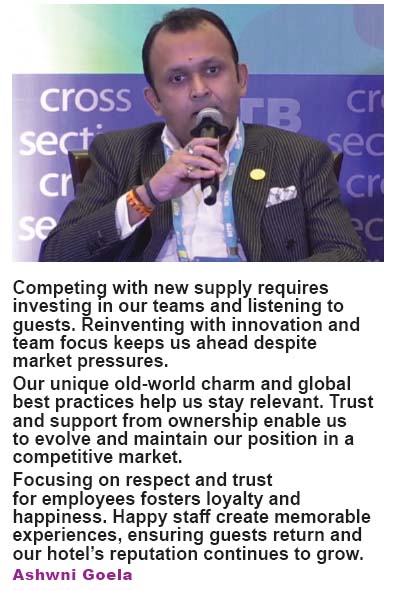 Ashwni Goela: Yes, we’ve had a when we actually opened up so like you mentioned, we were the first private airport hotel in India and I guess for the for the next 10-11 years, people were still understanding this market, it took its time for it to ramp up. We had some great F&B outlets, it was an F&B destination, when it opened up with multiple outlets, but some being very innovative. The first sports bar was here. The first kebab factory, which was again a new concept, was here. New York Cafe was a fun cafe. And yes, so that attracted a lot of guests and a lot of people to come and see it. As it happens in every business, like you mentioned, everything that goes up has to come down. Yes, it came down. And with Aerocity coming up in 2014 till about, I think, 17 and 18, we were under a lot of pressure. So, in 2018, when we kind of reinvented and we saw what to do, and the only thing I could realize was to compete with this competition. The only thing that was in our favor was our team and our guests. So, what we did was, that we heard what our guests have to say and we heard what our teams have to say. And all we did was iron them out and ensure that we could invest in our teams to take care of our guests.
Ashwni Goela: Yes, we’ve had a when we actually opened up so like you mentioned, we were the first private airport hotel in India and I guess for the for the next 10-11 years, people were still understanding this market, it took its time for it to ramp up. We had some great F&B outlets, it was an F&B destination, when it opened up with multiple outlets, but some being very innovative. The first sports bar was here. The first kebab factory, which was again a new concept, was here. New York Cafe was a fun cafe. And yes, so that attracted a lot of guests and a lot of people to come and see it. As it happens in every business, like you mentioned, everything that goes up has to come down. Yes, it came down. And with Aerocity coming up in 2014 till about, I think, 17 and 18, we were under a lot of pressure. So, in 2018, when we kind of reinvented and we saw what to do, and the only thing I could realize was to compete with this competition. The only thing that was in our favor was our team and our guests. So, what we did was, that we heard what our guests have to say and we heard what our teams have to say. And all we did was iron them out and ensure that we could invest in our teams to take care of our guests.
We had repeat guests coming back. Second thing we did was that while everything was new over here, we capitalized on our old-world charm and we kind of leveraged on it by saying, it’s a nice, great, old world charm hotel, which people wanted to come and see and still be over here. Radisson Hotel Group brand, since I’ve worked with the brand earlier, we employ some of the best practices on the global systems that we had. And even though it was a franchise hotel, we worked on it like a managed hotel to ensure that we leveraged on the brand and the brand came in full depth outside. And, as always, gave us the entire help and support for us to be able to come back really quick. And last but not the least, our ownership, I think who always trusted what the team was doing and invested heavily on us to ensure that we are able to retain the team. So, despite all the adversities that we still have or we had, we’ve been able to stay ahead of the game and continue evolving from where we are.
Achin Khanna: Sharad, it’s known well that JW is a large format hotel with a diverse clientele. I have two questions for you and if I know the answer to the first, I know the second one is going to follow. Which is your favourite segment, which is your most popular one that you do the most business with and why?
Sharad Datta: Okay, so a short answer, the segment that sends the largest amount of money into the bank, but no look we have a huge advantage in two ways, one location, being the gateway city and our presence and an incredibly strong brand on the building, and like every hotel we have a traditional segment. So, for us we have a little bit of leisure. We have a lot of corporate. We have a strong MICE space because we also have large banqueting facilities.
But my personal favorite has to be retail. And I think why because I think retail allows us the opportunity of firstly it’s the one that gives you the best bang for the buck, right, in terms of rev par and the yield that it has per room, it’s the best. Second, it gives us the opportunity for really using what we want to do is go digital direct, so direct bookings, using our Marriott Bonvoy, the app, as well as our Marriott website to drive digital direct, it becomes easier that way because then we have the opportunity of doing a few things, pricing, packaging, personalization, and how we use the Marriott platforms to drive this business and the costs are minimal in this. Because it drives a lot of money, it’s my personal favorite and also our recognition or loyalty program is so strong and we have so many ambassador elites and platinum elites and they are well traveled so they understand the power of the brand and the power of Marriott Convoy. Retail drives it more, MICE is yes, it is there but it’s not as high a percentage as retail and I think Meena mentioned about corporate and retail, now kind of, you know, amalgamating and merging into each other.
Achin Khanna: Okay so the follow-up for both and then also to you Vineet is talking about MICE and the Yashobhumi Convention Center having recently opened. Helped, harmed? What has it done for you guys?
Sharad Datta: Definitely helped and I think it’s just the start. Look, it’s a large convention center and a modern one and any international convention center takes a few years to ramp up and grow, because international conferences have a longer lead time. It’s already started to help us. And I think for a large inventory hotel like mine, very important to find groups that don’t necessarily have catering attached to it, because then it really helps you to build your occupancies.
The second piece about the lead time that I spoke about, so it gives you an opportunity to really plan and forecast better for the future. So definitely I think it’s just started and I think the benefits for Aerocity hotels are still to be seen from this.
Vineet Mishra: You see Yashobhumi as a challenge or an opportunity, that’s the question. So, it’s clearly an opportunity. The fact is that now I know my rooms, I don’t have to put a group ceiling anymore with my banqueting. I can actually start going across and looking at non-residential large format, medium format functions at the large ballroom that we have which early on we would have possibly restricted saying that I will just take it three months out when I am quite sure about it. So, Yashobhumi is actually giving us, I think a lot of foresight into what could be coming in the future. It will only make just not Aerocity but I think pretty much the Delhi market much stronger than where it was and ultimately everyone is gaining out of it.
Achin Khanna: Meaningful convention centers have a habit of actually helping the entire city and act as serious infrastructure as you know and if you were to just look outside of India to some of the other major markets, I mean the Berlin and the Tokyo and the Philadelphia of the world, they are largely built on the back of their convention facilities.
Vineet Mishra: I could actually just also add, we are running large convention centers ourselves in Hyderabad, we’ve seen this happen, it actually feeds into a lot of demand in the city and similarly at JEC in Jaipur, just a year and a half old right now, but it’s pretty much changed the whole geography of the city actually, so that’s, it’s great for us and the only thing is that the infrastructure development along with this has to support what’s being put out there as a physical product.
Achin Khanna: Rohit, just since we’re on Delhi NCR, your NCR footprint and how’s the pipeline looking?
Rohit Arora: Not in NCR as of now, but there are many assets which we are very closely working on. So, in the hills also and in Rajasthan also.
Achin Khanna: I’m going to ask you a question that I think at some stage somebody in everybody in this room has asked themselves about the Park Hotels, but we don’t know truly the answer. How do you guys do 90% plus occupancies consistently across so many hotels?
Rohit Arora: Well, see the teams have been trained on it, so we also have a very strong digital handling our businesses, whether it is through a brand website or whether it is through GDS. And the pricing part of it is very, very dynamic. It is like if you take an example of our, we run two hotels in Delhi. One is the Rark, which is in CP, which does almost 93%. And the other hotel is in Saket which is under different other brand which is called Zone Connect by The Park and that hotel does 100% occupancy day on day basis. So, we have got 60 rooms and all the 60 rooms are filled every day.
Achin Khanna: If you could spend double the money you’re spending now, where would you spend that and why?
Meena Bhatia: I think it’s a no-brainer marketing, definitely. I mean that’s the one area, and especially these days with all the digital marketing and the new ways of marketing, I think I would put a lot of money and emphasis on marketing at the moment.
Achin Khanna: Anybody else want to share a different department perhaps or does everybody agree?
Vineet Mishra: Payroll.
Achin Khanna: Okay, Kush, how much of your top line across your portfolio contributions come from non-room revenue streams like wellness or food and beverage, et cetera.
Kush Kapoor: So, I’ll keep a percentage aside if I could just stress on the other thing. So, we opened our cafe, first standalone cafe, Roasted Bread Roseate Cafe in Vasant Kunj, three years back. The revenue in the last three years has gone up by five times, which has led us to open up, we are on the verge of opening three more outlets in Delhi and Gurgaon in next 12 months from now, the standalone cafes I’m talking about. Along with that, we run three more co-working space. The revenues for that also gone five times high. Third, is my ice-skating ring, which is 18,000 square feet, the only ice skating ring in the country right now. The revenue post-COVID has shown four times the growth on that. We’re helping two state governments right now to build the ice skating rings, because my engineers and my own team are equipped enough to open the ice skating rinks right from scratch. We got the complete knowledge with that now. Fourth, very interesting, is we started Mithai by Roseate probably six months back and we were doing all in-house, the amount of word-to-mouth growth which we saw. In February or in Jan you will see the first Mithai by Roseate store stand-alone opening in Delhi, outlet I am talking about, complete stand-alone outlet.
And fifth and the last is the spa. We have got certain therapies which were lost 5000 years ago in Ayurveda. We got Marmar doctors on board, we got Meru doctors on board, we got CST specialists on board. We got Nadi doctors on board. So, if you’re dining in the restaurant right now, you can actually get your Nadi checked before you have your food and that’s free of cost, basically, only because you’re dining and booking directly through us.
So that’s kind of an innovation in terms of getting more F&B revenues coming in. My spa revenue is at the moment for last year, I would say, the top line, the percentage I’m talking about was 1.5, it has grown to 2.8% of the total hotel revenue, right now from the spa. Because of all these things what we got, I got four doctors, authentic Ayurvedic doctors on board and that has shown huge, huge massive improvements in terms of the revenues coming on board.
Achin Khanna: Greesh, the question for you, we have Sharad and Vineet here and I will take their examples because what they have and one can’t put enough value to it, is Bonvoy and Accor Limitless. We have Hilton owners with Zubin sitting here. That’s gotta be something that you miss, right? I mean, it is a huge driver of demand, and more so now, post-COVID, loyalty has become a real thing for people. And there was some rhetoric around loyalty up until maybe pre-COVID, loyalty has become a real thing for people. And there was some rhetoric around loyalty
up until maybe pre-COVID that it’s not really, and people look for the best deal possible. But today, that’s not the case. There’s genuine data to prove that people will choose even a more expensive hotel just in the interest of earning loyalty points. Do you face that as a challenge, that you can’t offer that?
Greesh Bindra: Absolutely. I think in a standalone hotel I think that’s a very big challenge and it is an issue. We try and push something called Suryaa Connect for which we have a card. Now we have another hotel, the parent company has another hotel in Tajikistan. We try and combine it but it just doesn’t work. So as a standalone, this is one big disadvantage that we have. Because there is no loyalty. The only thing that you can do is get repeat clients. And you can only satisfy them with personalized service. There’s no shortcut to it.
Achin Khanna: Ashwini, what’s the one hotel trend you hope never comes back?
Ashwini Goela: The plastic bottles for the amenities that we had and which now it’s gone off and it’s moved to bulk amenities, I would just hope that it wouldn’t come back.
Sharad Datta: For us, I think it is rank and file and I think a lot of hotels are following suit, it’s a 9 hour shift and to what Vineet alluded earlier in terms of the expectations, paying overtime, this is something that’s here and we don’t want to go back to that acceptance to that 12 to 14 hours. So, fortunately for us we have systems that catch you if you don’t do it right and I think it’s more about being aware and really any initiative that comes to play has to be driven right and Marriott is very good at driving initiatives. So, it works.
Vineet Mishra: Making videos to say we are safe and clean.
Kush Kapoor: So I’ll just use the three words which we heavily emphasize on. It’s the emotions, experience, and the engagement. I’ll start from the staff, actually. The team doesn’t want to experience the same, especially the young crowd today. They want you to talk the way they want. They want you to walk the way they want. When I opened the brand, I removed all the offices from my hotels, not even the general manager, not even I have an office. So we all sit in the basement, in the parking in all the hotels. Nobody has an EA, nobody has a PA. Everybody’s got smart laptops and mobile and that trend is going to come forward moving forward.
So when I talk about three things, emotions, experience and engagement, right from the employee to the guest, they want every single day a new experience, a new emotion, a new engagement. If you’re able to do that, you’ve scaled the market.
Achin Khanna: What’s your hotel’s secret sauce? The one thing that employees, owner, guests always rave about when it comes to your hotel.
Sharad Datta: I think what I have realized in this hotel is that there’s a certain vibe to the hotel. It’s that kind of thing, that intangible bit, which is something that I’ve heard a lot about from customers, from associates also now. And of course there is a lot of work that goes behind it, but I would say that people rave about the vibe of the hotel and the warmth that they feel.
Vineet Mishra: A happy hotel is a happy hotel. The minute you walk into a hotel which has got the right bounce and feel, you will know it. Secondly, it’s very basic. I think it’s all about how you make a person feel. If you get that right, okay, with your guests, with your colleagues, when you go back home, you walk in with a bounce. If you do, then you’re in the right place. That’s all I have to say.
Rohit Arora: One word, location.
Meena Bhatia: I think in our case it’s consistency, it’s been consistency of the brand, consistency of service offerings, consistency of people.
Kush Kapoor: Just keep it simple. We are all handing human beings, not robots. We do have robots, but keep it simple. And human beings want a simple life.
Greesh Bindra: So, I would say it’s more personal touch. For example, I’ll just go a little deeper into it. We haven’t spoken about medical tourism. I mean, our location, like what Rohit just said, is important because I have hospitals, three, four of them around the hotel. We are the only hotel in Delhi NCR that has seven disabled rooms. And I’d done this planning in 2005 when I used to be there, when I was a Crown Plaza, I spoke to the chairman. And today, we go a step further. We have tie-ups with Apollo, and with every disabled room, I have an interconnecting room. The length of stay of the guest there is anything from three weeks to three months, depending on what surgery is here. People from UK, Middle East, are all flying into Delhi for surgeries. My chef actually talks to the dietician at the hospital and gets an order what is the actual diet to be given to the patient. So these are little things that make so much of a difference.
Ashwni Goela: I think respect and trust our employees I think and our employees speak a lot about that, that you know if we get respect and if we get their trust over here, we get happy guests back over here.

